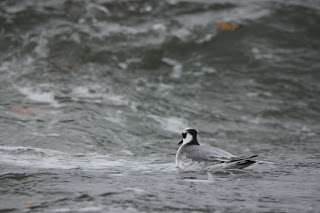Following the success of the previous day's trip to see the Hoopoe, we travelled down to Oxfordshire's Farmoor Reservoir, to see the 1st Winter Grey Phalarope, which had arrived 2 days before. It was the second time we'd been there this year, having got the Red-Necked Grebe back in April there as well. When reading my bird guide, I was informed that the species in question is only blown in by autumn gales to inland lakes, and is used to rough seas. Well, if ever there was an inland sight that mimicked the sea, this was certainly it. After applying dozens of layers, we got out of the car and headed for the reservoir wall. Once there, the wind was so strong, it was difficult to stand up, with many people being blown around themselves. Not knowing where the bird was, we decided to check the area where the Grebe had frequented. Coot, Mallard and Little Grebe were all present. I then spotted a way off, a man with a large camera lens at ground level, taking shots of a patch of water. Upon scanning the patch, I raised the alarm-
Grey Phalarope! We made our way to where the man was, the water lapping at our feet. I was struck by how small the bird was, feeding and preening about 10 metres from the shoreline.
 |
| Grey Phalarope preening |
 |
| Grey Phalarope feeding |
 |
Grey Phalarope in flight
|
After 5 minutes the bird struck up, and flew a way down the shore, and landed even closer to it. All of us there hurriedly made our way to the spot, and with the bird now only several metres away it was hard not to get a good shot. You must excuse the number of shots taken, but with such a close model, I couldn't refuse!
 |
| Grey Phalarope |
 |
| Head-on |
 |
| Grey Phalarope |
 |
| Calling |
 |
| Riding a nearby wave crest |
 |
| In the frothing waters |
 |
| Grey Phalarope |
With the wind magnified, so were the waves. The poor little bird was flung around from side to side with each oncoming wave, yet still seemed unfazed, often flying back to the more sheltered right hand side before returning to feed in more open water. It often shared the surf with leaves that had been blown in from the nearby trees.















